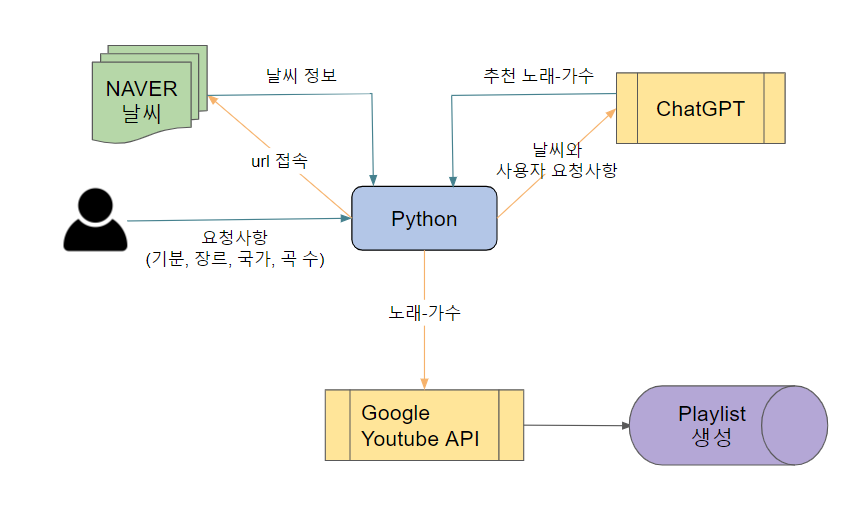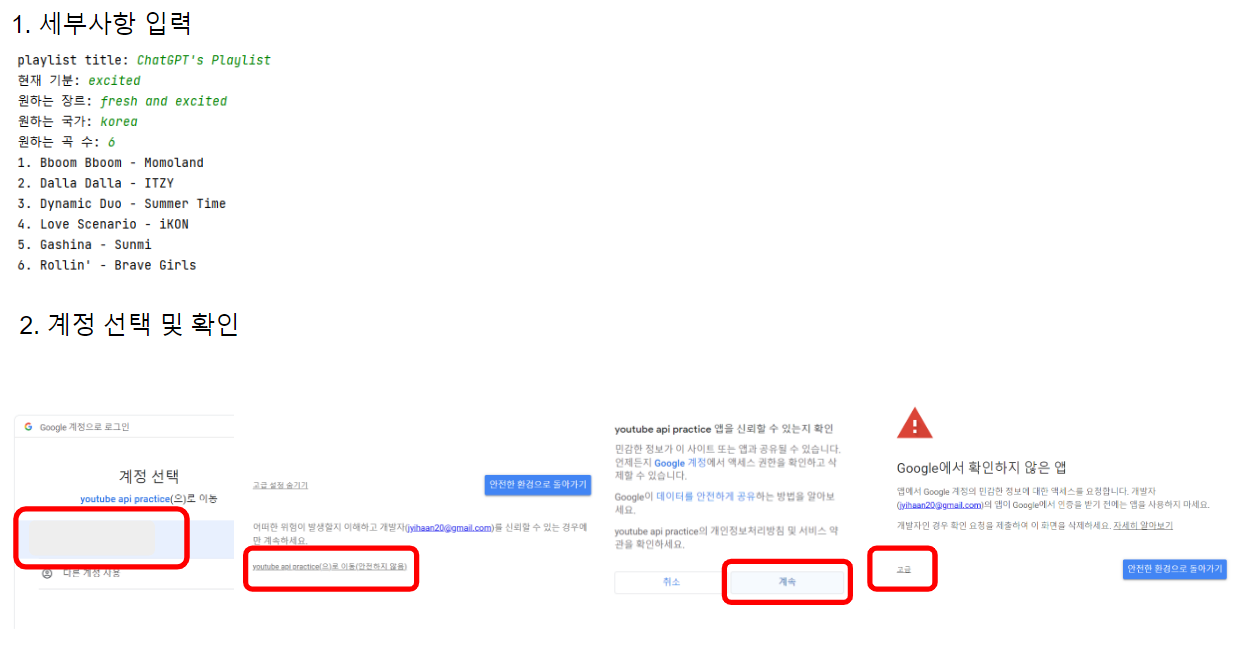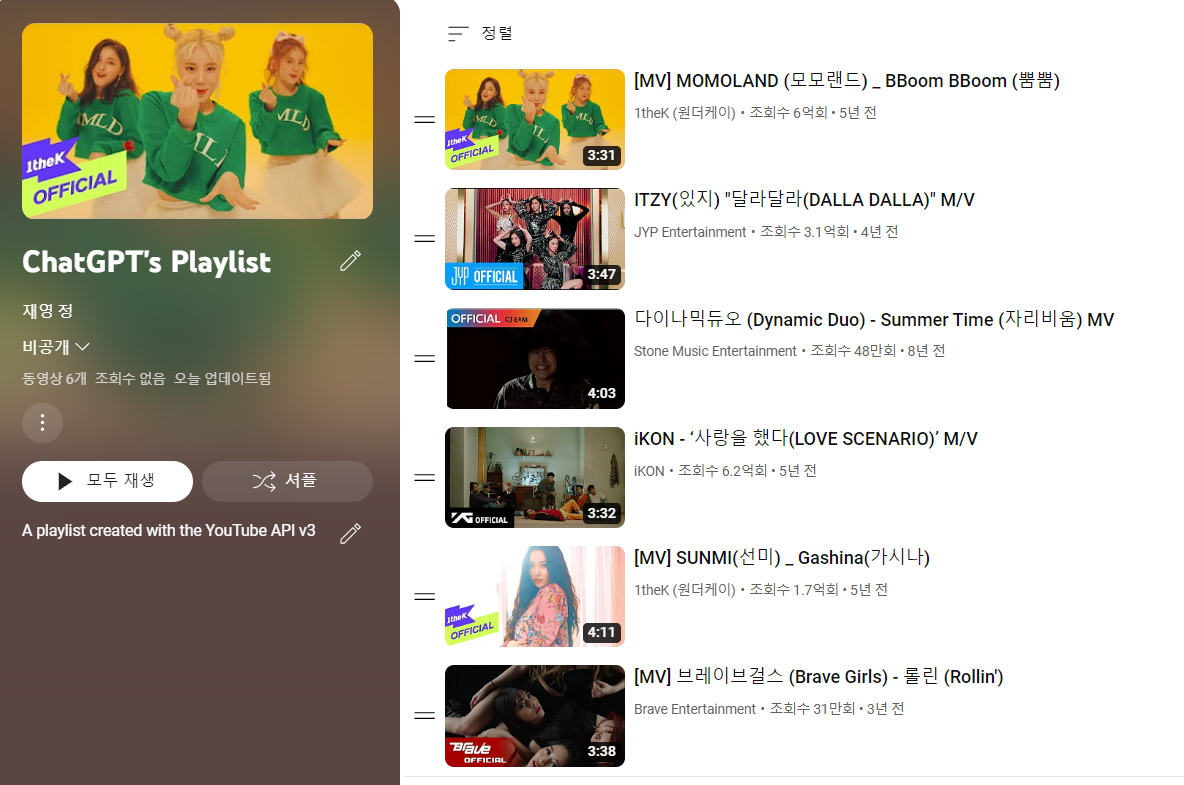날씨와 기분에 맞는 유튜브 플레이리스트 생성기
서비스 소개
현재 날씨와 사용자의 기분 및 요구사항(장르, 곡 수, 국가)에 따라 자동으로 유튜브 플레이리스트를 생성해줍니다.
서비스 제안 배경
날씨에 따라, 기분에 따라 듣고 싶은 노래가 시시각각 변합니다. 그런데 딱히 듣고 싶은 노래를 특정할 수 없어 고민하고, 노래를 고르다가 시간을 허비합니다. ChatGPT의 도움을 받아 내 입맛에 맞는 플레이리스트를 만들고 즐겨봅시다!
- 사용자가 음악을 찾는 시간과 노력을 줄여줍니다.
- 날씨와 기분에 맞는 음악을 듣는 것은 기분 전환이나 스트레스 해소에 효과적입니다.
적용 기술 및 방식

실행


코드공유
from googleapiclient.discovery import build
from googleapiclient.errors import HttpError
from google_auth_oauthlib import flow
import requests
import json
import openai
import webbrowser
from bs4 import BeautifulSoup
openai.api_key = "OPEN AI API KEY" # Open-AI API KEY 발급 및 입력
# Base Prompt & Input -> GhatGPT Result
def generate_response(weather, mood, genre, number, country):
URL = "https://api.openai.com/v1/chat/completions"
payload = {
"model": "gpt-3.5-turbo",
"messages": [{"role": "user",
"content": f"You are an AI tool that recommends songs based on the weather and the user's mood."
f"Users will give user weather, current mood, genre user want, number of songs user want, and country information user want."
f"Based on this information, please organize the title of the singer and song."
f"Please answer in the same format as 'Song title - Singer'."
f"The information provided by the user is as follows."
f"user weather: {weather}"
f"current mood: {mood}"
f"genre user want: {genre}"
f"number of songs user want: {number}"
f"country information user want: {country}"}],
"temperature": 1.0,
"top_p": 1.0,
"n": 1,
"stream": False,
"presence_penalty": 0,
"frequency_penalty": 0,
}
headers = {
"Content-Type": "application/json",
"Authorization": f"Bearer {openai.api_key}"
}
response = requests.post(URL, headers=headers, json=payload, stream=False)
resp = json.loads(response.content)
return resp['choices'][0]['message']['content']
# Naver Weather Crawling
def weather_parser():
url = 'https://search.naver.com/search.naver?where=nexearch&sm=top_hty&fbm=0&ie=utf8&query=%EB%82%A0%EC%94%A8'
response = requests.get(url)
soup = BeautifulSoup(response.content, 'html.parser')
temp = soup.find('div', {'class': 'temperature_text'}).text
summary = soup.find('dl', {'class': 'summary_list'}).text
weather = f'{temp}{summary}'
return weather
# Set up YouTube API credentials
CLIENT_SECRETS_FILE = 'client_secret.json'
SCOPES = ["https://www.googleapis.com/auth/youtube.force-ssl"]
API_SERVICE_NAME = "youtube"
API_VERSION = "v3"
# Authenticate the user and build the YouTube API client
def get_authenticated_service():
auth_flow = flow.InstalledAppFlow.from_client_secrets_file(CLIENT_SECRETS_FILE, SCOPES)
credentials = auth_flow.run_local_server(port=0)
return build(API_SERVICE_NAME, API_VERSION, credentials=credentials)
# Get the YouTube video ID for a given song
def get_video_id(title, artist):
query = f"{title} {artist} official video"
api_key = "Google Youtube API KEY"
url = f"https://www.googleapis.com/youtube/v3/search?part=snippet&q={query}&key={api_key}&maxResults=1&type=video"
response = requests.get(url)
json_data = json.loads(response.text)
video_id = json_data['items'][0]['id']['videoId']
return video_id
# Create a new private playlist on YouTube
def create_playlist(youtube, title):
try:
playlists_insert_response = youtube.playlists().insert(
part="snippet,status",
body=dict(
snippet=dict(
title=title,
description="A playlist created with the YouTube API v3"
),
status=dict(
privacyStatus="private"
)
)
).execute()
return playlists_insert_response["id"]
except HttpError as error:
print("An error occurred: %s" % error)
return None
# Add a video to a YouTube playlist
def add_video_to_playlist(youtube, video_id, playlist_id):
try:
add_video_request=youtube.playlistItems().insert(
part="snippet",
body=dict(
snippet=dict(
playlistId=playlist_id,
resourceId=dict(
kind="youtube#video",
videoId=video_id
)
)
)
).execute()
return add_video_request
except HttpError as error:
print(f"An error occurred: {error}")
return None
# Create a new YouTube playlist and add all songs in the dictionary to it
def create_and_add_songs_to_playlist(playlist_title, songs):
# Authenticate the user and build the YouTube API client
youtube = get_authenticated_service()
# Create a new private playlist on YouTube
playlist_id = create_playlist(youtube, f"{playlist_title}")
# Add each song in the dictionary to the playlist
for title, artist in songs.items():
video_id = get_video_id(title, artist)
add_video_to_playlist(youtube, video_id, playlist_id)
playlist_url = f"https://www.youtube.com/playlist?list={playlist_id}"
webbrowser.open(playlist_url)
print("All songs added to the playlist!")
def main():
playlist_title = input("playlist title: ")
weather = weather_parser()
mood = input("현재 기분: ")
genre = input("원하는 장르: ")
country = input("원하는 국가: ")
number = input("원하는 곡 수: ")
response = generate_response(weather, mood, genre, number, country)
texts = response.split('\n')
songs = {}
for text in texts:
title = text.split(' ')[1]
artist = text.split(' ')[-1]
dic = {title: artist}
songs.update(dic)
create_and_add_songs_to_playlist(playlist_title, songs)
if __name__ == '__main__':
main()